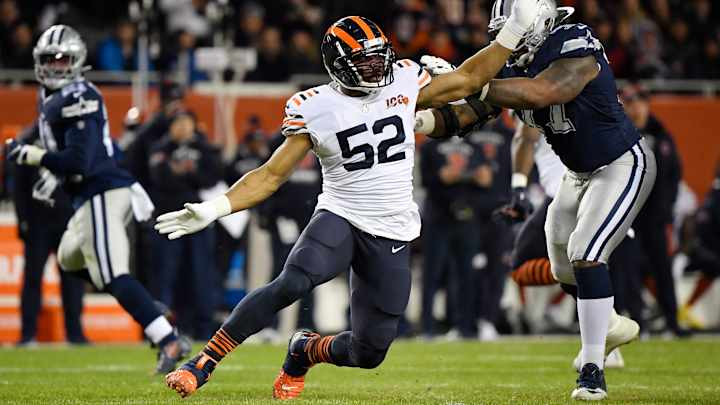Where Bears Defense Must Step Up Its Game Most

When the 2019 season ended, Chicago Bears coach Matt Nagy quickly and decisively made three coaching changes on offense after identifying those who weren't with the program.
And on the defensive side?
Crickets.
Chuck Pagano's staff got off entirely free of change, save Chris Jackson moving from defensive backs assistant to a newly created position as wide receivers assistant. The defense added Dave Toub's son Shane as a defensive quality control coach for next year, but like Jackson he was already on the staff.
Standard operating procedure for Matt Nagy was hands off when it comes to the defense. He handled it this way in 2018 when Vic Fangio was defensive coordinator, and has taken the same approach with Pagano.
Perhaps because of the offense's problems and also because of the injuries suffered by Akiem Hicks, Danny Trevathan and Roquan Smith, the defense skated away without much blame. They should have received their fair share.
There were defensive failures in 2019, although not to the extremes of the offense. They're situations which much be corrected going forward.
Although a healthy Hicks and Smith can solve some of the problems, there are other issues.
In any professional league, the old saying "if you're not getting better, you're getting worse," applies.
The Bears need to address these troubles defensively in the offseason in some way or expect problems again even after they get to full health.
3. The Cutback Run
When Oakland burned the Bears repeatedly with outside zone blocking and backs cutting back against the flow, it gave future opponents a better idea how to move an unmovable object. Minnesota had tried this the previous week, failed miserably and it seemed to give the Bears some sort of defensive feeling of invincibilty. The Bears had been No. 1 against the run in 2018, and as anyone with a minutia of knowledge knows, you have to stop the run to earn the right to rush the passer. The defense had trouble from the Oakland game on at stopping outside zone running. With Hicks, maybe this doesn't happen. However, when they didn't have him against Minnesota they were able to stop it. Stopping the run is more of a matter of will. A team has to want to be stout and do what's needed. Winning the war at the point of attack is a matter of toughness. The Bears have to regain theirs. An offseason when people were throwing compliments their way and comparing them to the 1985 defense seemed to soften them more than any offense could. Stop the run. It's the most basic essential component of good defense. And in the Bears' case it's that outside zone play.
2. Complementary Pass Rush
Getting heat on a quarterback doesn't always need to come from one man. Khalil Mack had 12 1/2 sacks his first year and then 8 1/2 last year when teams began double-teaming and triple-teaming as a major part of their game plan. They need a better and more effective plan for dealing with this tactic. Stunting Mack with whoever lines up alongside him—usually Hicks but not always—is one way. Players can pick off blockers by taking their rush in his direction. It's not always players. Moving Mack around more can work, as well. If they blitz a slot cornerback or linebacker, it can be off that same side as Mack to occupy blockers and create one-on-one situations. More must be done to enhance the best weapon the Bears have on either side of the ball.
1. Closing Out Games
This falls largely on defensive backs, but the linebackers in coverage and the pass rush also accept some blame. Last year the Bears led or were tied starting the fourth quarter in 10 games, yet they came out with an 8-8 record. They didn't finish off games. They were outscored in the fourth quarter 116-55. Some blame for this got pointed at their offense's inability to stay on the field and control the ball. While this was true in isolated instances, by and large it didn't apply. The Bears finished 13th in time of possession at 30:16 per game. On average, the defense wasn't overtaxed. They just failed at big points in games. They let Denver go down and score 11 fourth-quarter points to result in overtime. People tend to forget they had the lead against Oakland after trailing 17-0, then the defense collapsed in the fourth quarter. The defense couldn't stop the Rams or Chargers in the fourth quarter, either. Get off the field and give the offense another chance is their mantra. They failed and need tighter, better coverage and the complementary pass rush at crucial points in games. The big turnover or the big sack go a long way in the fourth quarter, and the Bears didn't have them in 2019.
Twitter: BearDigest@BearsOnMaven
